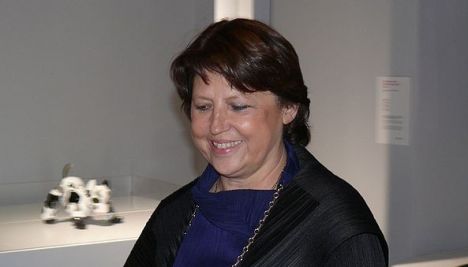“We know that France is going through a difficult time, but I am resolved to fight with all my strength to give her a future again,” she told a gathering of supporters in the northern town of Lille, where she is mayor.
She vowed “to restore our country and to unite it in justice,” in a speech that drew loud applause from her supporters.
Aubry, 60, will now compete against fellow Socialists, including former party leader Francois Hollande and former presidential contender Segolene Royal, for the nomination at a two-round primary contest in October.
On Monday, Sarkozy touted his investments programme to stimulate the economy, in a major news conference that appeared timed to present himself as a strong economic performer as the election race gathers pace.
Aubry meanwhile cast herself as a candidate of the people, campaigning against power and privilege at a time of mistrust of the political elites and financial forces blamed for the economic crisis.
She accused the current government of “unjust policies, carried out exclusively for the benefit of the most privileged.”
Sarkozy promised massive investment in education, research and development to keep France competitive.
Aubry retorted on Tuesday: “We cannot innovate, create, heal and educate while subjecting our vital needs to the law of the market alone.”
Aubry is best known for introducing France’s 35-hour work week when she was employment minister under Socialist premier Lionel Jospin in the late 1990s.
Her father is the former European Commission president Jacques Delors.
Recent opinion polls suggest both she and former Socialist leader Francois Hollande could comfortably beat Sarkozy in the first round of voting, and would then have to win over centrist voters in the run-off.
An IFOP poll published Monday showed Hollande with 43 percent of support from party members, ahead of Aubry with 34 percent.
The Socialists were thrown into turmoil in May when top candidate Dominique Strauss-Kahn, who had polled as favourite to beat Sarkozy, was arrested in New York, accused of sexually assaulting and trying to rape a hotel maid.
He denies the charges, but the scandal wrecked his electoral hopes and forced him to resign as head of the International Monetary Fund (IMF).
Since Strauss-Kahn’s downfall, Hollande has moved up in the polls to become the top contender, with Aubry second.
Sarkozy has yet to formally announce a re-election bid, but has already begun making regular campaign-style visits and no other serious challenger has emerged from within his right-wing UMP party, 10 months ahead of the vote.




 Please whitelist us to continue reading.
Please whitelist us to continue reading.
Member comments